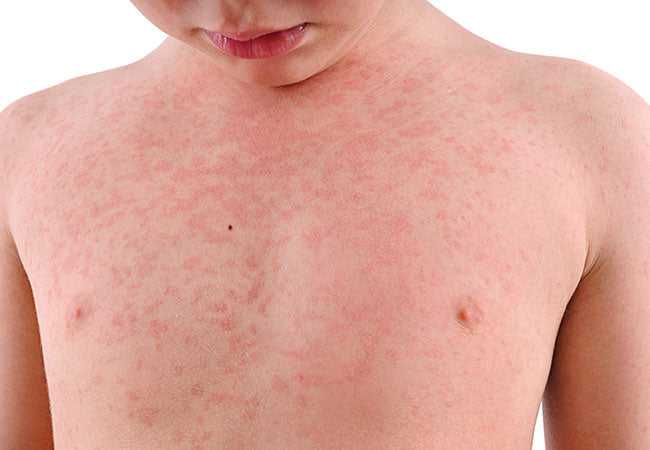What is Eczema?
Eczema (also known as Atopic Dermatitis) is inflammation of the skin, typically characterized by itchiness, redness and a rash. It's common in children but can occur at any age. Atopic dermatitis is long lasting (chronic) and tends to flare periodically. It may be accompanied by asthma or hay fever.
Cause, Diagnosis and Cure
The cause of eczema is unknown but is presumed to be a combination of genetic and environmental factors. In some children, food allergies may play a role in causing eczema. Healthy skin helps retain moisture and protects you from bacteria, irritants and allergens. Eczema is related to a gene variation that affects the skin's ability to provide this protection. This allows your skin to be affected by environmental factors, irritants and allergens.
Diagnosis of eczema is based mostly on the history and physical examination. In uncertain cases, skin biopsy may be taken for a histopathologic diagnosis of dermatitis. Those with eczema may be especially prone to misdiagnosis of food allergies.
No cure has been found for eczema. But treatments and self-care measures can relieve itching and prevent new outbreaks. Treatment of atopic dermatitis is typically with moisturizers and steroid creams. Non-steroid creams are always preferred given the potentially severe side effects caused by steroid. Antibiotics may be required if there are signs of skin infection. Contact dermatitis is typically treated by avoiding the allergen or irritant.
Management
Majority of the eczema treatments aim to control symptoms by reducing inflammation and relieving itching.
Lifestyle
Bathing once or more a day is recommended, usually for five to ten minutes in warm water. Soaps should be avoided, as they tend to strip the skin of natural oils and lead to excessive dryness. There has not been adequate evaluation of changing the diet to reduce eczema. There is some evidence that infants with an established egg allergy may have a reduction in symptoms if eggs are eliminated from their diets.
Moisturizers
Evidence indicates that moisturizing agents (emollients) may reduce eczema severity and lead to fewer flares. Some moisturizers or barrier creams may reduce irritation in occupational irritant eczema, a skin disease that can affect people in jobs that regularly come into contact with water, detergents, chemicals or other irritants. Some emollients may reduce the number of flares in people with dermatitis.
Medications
If symptoms are well controlled with moisturizers, steroids may only be required when flares occur. Corticosteroids are effective in controlling and suppressing symptoms in most cases. Once daily use is generally enough. While these usually bring about rapid improvements, they have greater side effects.
When eczema is severe and does not respond to other forms of treatment, systemic immunosuppressants are sometimes used. Immunosuppressants can cause significant side effects and some require regular blood tests. The most commonly used are ciclosporin, azathioprine, and methotrexate.
Long term use of topical steroids may result in skin atrophy, stria, telangiectasia. Their use on delicate skin (face or groin) is therefore typically with caution.
Light therapy
Light therapy using ultraviolet light has tentative support but the quality of the evidence is not very good. A number of different types of light may be used including UVA and UVB; in some forms of treatment, light sensitive chemicals such as psoralen are also used. Overexposure to ultraviolet light carries its own risks, particularly that of skin cancer.


